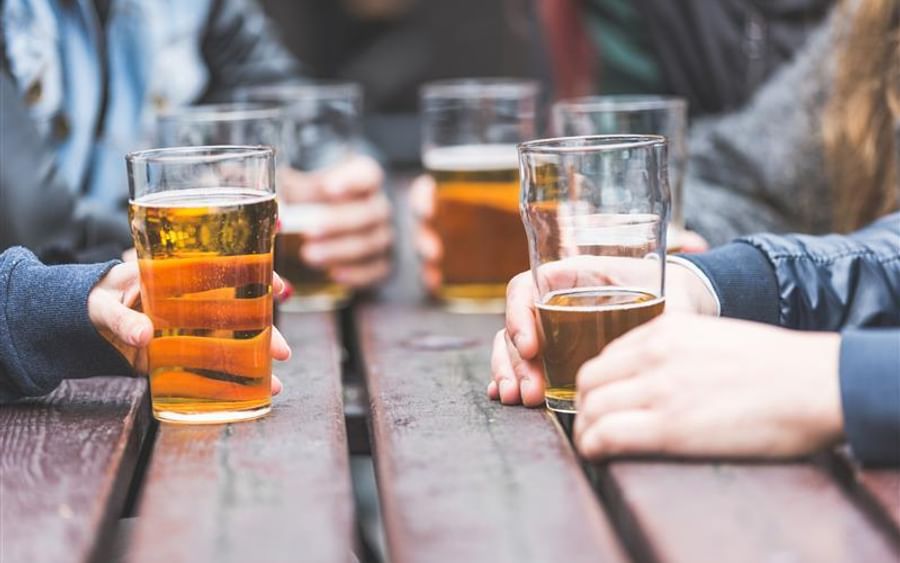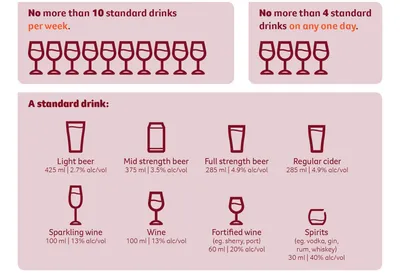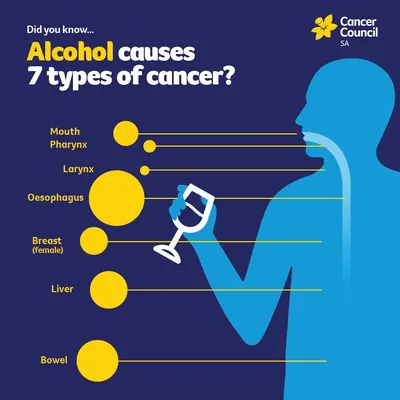Cancer Council SA recommends to avoid or limit drinking alcohol. If you choose to drink alcohol, follow the National Health and Medical Research Alcohol guidelines of no more than 10 standard drinks per week and no more than four standard drinks on any one day.
The less you choose to drink, the lower your risk of alcohol related harm. For some people, not drinking at all is the safest option.
What is a standard drink?
In Australia, one standard drink contains 10g of pure alcohol. Any amount or type of alcohol can increase the risk of cancer, regardless of whether it is beer, wine or spirits.
Tips for drinking less
- Use water to quench thirst.
- Have alcohol-free days each week.
- Suggest venues outside of bars and pubs to meet friends, such as meeting over coffee or going for a walk.
- Choose a non-alcoholic drink.
- Alternate alcoholic drinks with non-alcoholic drinks or choose smaller serves when ordering.
Alcohol and cancer in Australia
It is estimated that around 5,800 new cancer cases diagnosed every year in Australia are due to alcohol use.
While the link between alcohol and cancer was made almost 40 years ago back in 1988, research shows that only one in three South Australians link alcohol as a very or extremely important risk factor for cancer.
Drinking alcohol causes seven types of cancer including mouth, throat (pharynx and larynx), oesophagus, bowel, liver and breast (female).
How does alcohol cause cancer?
The evidence that alcohol causes cancer is clear and proven by scientists. Alcohol is a Class 1 carcinogen (cancer causing agent).
Alcoholic drinks contain ethanol, which irritate and change the cells in our bodies. Over time, these changes can cause cancer.
Damaging DNA
When we drink alcohol, our bodies turn the ethanol into a chemical called acetaldehyde. When alcohol is digested, it is broken down into acetaldehyde in the mouth, stomach and liver. Acetaldehyde is toxic and can build up in our bodies, causing permanent damage to the DNA of our cells.
Hormone change
Alcohol can also change the hormones in our bodies, such as increasing levels of oestrogen, reducing how well insulin works, and reducing folate absorption. This can lead to abnormal cell changes and increase the chance of cancer developing.
An increase in oestrogen can change the structure of mammary glands and increases the risk of breast cancer developing.
Absorption in the mouth
Alcohol can alter the cells in the mouth and throat. It can also act as a solvent, making it easier for other carcinogens like tobacco to be absorbed, and increasing the chance of cancers of the mouth, throat and oesophagus.
Policy work on alcohol
Education and campaigns are important, but sometimes policy change is needed to create healthier and safer environments for all people. The most effective strategies to reduce alcohol harms are raising taxes, reducing availability, and restricting or banning advertising.
Cancer Council Australia’s advocacy
As Australia’s peak, national, non-government cancer control organisation, Cancer Council Australia advises the Australian Government and other bodies on practices and policies to help prevent, detect and treat cancer. Learn more about Cancer Council Australia's Alcohol Prevention Policy.
National Health and Medical Research Council (NHMRC)
NHMRC provides guidelines for Australians aimed at reducing health risks from drinking alcohol, designed to help individuals make informed decisions about drinking alcohol.
The guidelines also provide health professionals, policy makers and the Australian community with evidence-based advice on the health effects of drinking alcohol. They are intended to form the evidence base for policy making and educational materials.
References
- Cancer Council Australia (2024) ‘Alcohol Prevention Policy’. Cancer Council Australia. Available at: https://www.cancer.org.au/about-us/policy-and-advocacy/prevention/alcohol
- Cancer Council Victoria ‘Ways alcohol causes cancer’. Cancer Council Victoria. Available at: https://www.cancervic.org.au/cancer-information/preventing-cancer/limit-alcohol/how-alcohol-causes-cancer
- Cancer Council Victoria (2023) Shape of Australia 2023 Survey: Final Report. Melbourne: Cancer Council Victoria.
- Cancer Research UK ‘How does alcohol cause cancer?’. Cancer Research UK. Available at: https://www.cancerresearchuk.org/about-cancer/causes-of-cancer/alcohol-and-cancer/how-does-alcohol-cause-cancer (Accessed: 28 March 2025).
- IARC (2024). Reduction or cessation of alcoholic beverage consumption. IARC Handb Cancer Prev. 20A:1-334. Available from: https://publications.iarc.who.int/638
- Rumgay, H., Shield, K., Charvat, H., et al. (2021) ‘Global burden of cancer in 2020 attributable to alcohol consumption: a population-based study’, The Lancet Oncology, 22(8), pp. 1071–1080. doi:10.1016/S1470-2045(21)00279-5.





